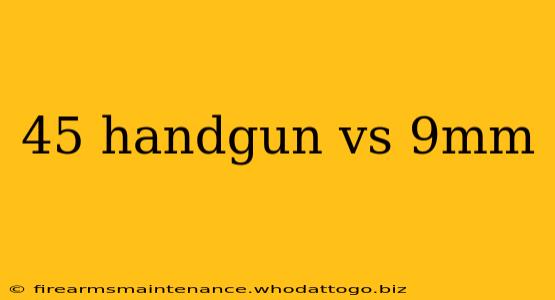Choosing the right handgun caliber is a crucial decision for both self-defense and recreational shooting. Two of the most popular choices are the venerable .45 ACP and the increasingly prevalent 9mm. This in-depth comparison will explore the key differences between these two calibers, helping you make an informed decision based on your individual needs and preferences.
Ballistics: Power vs. Control
The fundamental difference lies in their ballistics:
.45 ACP: Stopping Power
The .45 ACP, or Automatic Colt Pistol, is known for its substantial stopping power. Its larger diameter bullet (approximately .45 inches) delivers significantly more energy upon impact, potentially leading to faster incapacitation of a target. This heavier bullet also tends to create larger wound cavities, contributing to its perceived stopping power. However, this power comes at the cost of recoil, which can be more significant for novice shooters.
9mm: Capacity and Control
The 9mm Parabellum offers a compelling alternative. While delivering less stopping power per shot compared to the .45 ACP, it boasts higher magazine capacity in most handguns. This translates to more rounds available in a self-defense situation. Furthermore, the lighter recoil allows for faster follow-up shots, improving accuracy and control under stress. Advances in 9mm ammunition technology, such as higher-velocity rounds and improved bullet designs, have significantly narrowed the stopping power gap.
Accuracy and Recoil: A Shooter's Perspective
Accuracy and recoil are intrinsically linked. The heavier recoil of the .45 ACP can negatively impact accuracy, especially for less experienced shooters. The lighter recoil of the 9mm facilitates quicker target acquisition and more consistent shot placement, even in rapid fire scenarios.
Recoil Management: Training and Practice
While the 9mm generally offers a more manageable recoil, proper training and practice are crucial regardless of the caliber chosen. Mastering proper shooting techniques, including grip, stance, and breathing, minimizes the impact of recoil in both calibers.
Ammunition Availability and Cost: Practical Considerations
Both .45 ACP and 9mm ammunition are widely available, but the 9mm generally enjoys broader availability and often comes at a lower cost per round. This can be a significant factor for those who practice regularly or require large quantities of ammunition.
Concealed Carry: Size and Weight
The choice between .45 ACP and 9mm can also influence your concealed carry options. While both calibers are available in compact and subcompact handguns, the lighter weight and often smaller size of 9mm handguns can make them more comfortable for everyday carry.
Conclusion: Choosing the Right Caliber
The "better" caliber depends entirely on the individual shooter's needs and priorities.
-
Choose .45 ACP if: Stopping power is your paramount concern and recoil management isn't a major issue. You prioritize fewer, more impactful shots.
-
Choose 9mm if: Higher capacity, manageable recoil, faster follow-up shots, and lower cost are your primary considerations. You value rapid target engagement and higher ammunition capacity.
Ultimately, the best way to determine which caliber is right for you is to try both. Rent or borrow handguns in both calibers and spend time at the range to experience the differences firsthand. Consider your physical capabilities, shooting style, and intended use before making your final decision. Remember, responsible gun ownership includes proper training and safe handling practices, regardless of your chosen caliber.

